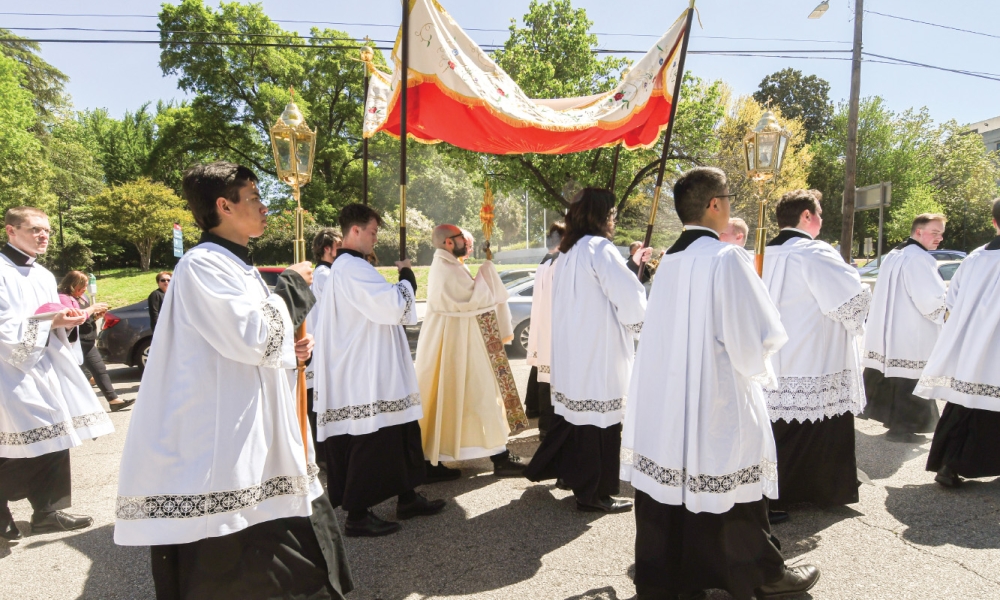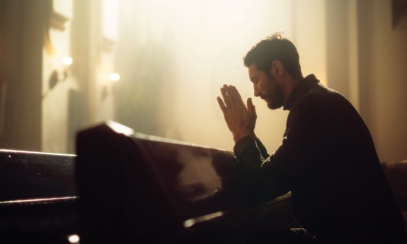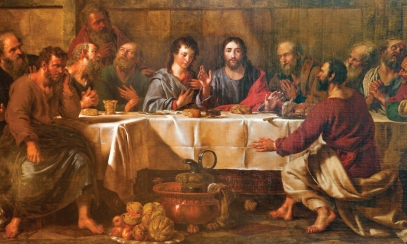
Moving forward: The Eucharist and the future
This month we hit a milestone in our shared Eucharistic Revival journey, celebrating the first National Eucharistic Congress in nearly a century. We are certainly at a high point of this process, and it might seem like the culmination of the entire movement. But the journey on which we set out two years ago is only beginning. Our real destination continuously lies before us.
This month we hit a milestone in our shared Eucharistic Revival journey, celebrating the first National Eucharistic Congress in nearly a century. We are certainly at a high point of this process, and it might seem like the culmination of the entire movement. But the journey on which we set out two years ago is only beginning. Our real destination continuously lies before us.
As I have noted here many times, the Eucharist points us to that eternal future of communion that is offered to us in Christ. The Eucharist always moves us forward. It is the sacrament that points us to the future, the sacrament where we glimpse the promise of salvation, the sacrament of hope. It is time for us to let the Eucharist move us forward.
It is important for us to consider the forward to which the Eucharist is pointing at this stage of the revival process. The Eucharist is calling us to a way forward here and now in addition to the eternal forward.
The promise of eternal communion that we taste in the body and blood of Christ is truly good news. In fact, it is the best news that we could possibly receive because we no longer have to experience the anxiety of death and nothingness. God, who created us in love, loves us so much that the eternal Son came down to be with us and bring us into the life of the Trinity. We are guaranteed a part in the loving relationship our hearts long for within the holy sacrament.
This brings us to the work that the process of Eucharistic Revival places before us. The Good News we encounter in the Eucharist demands to be shared. We cannot and must not keep it to ourselves. The joy of the Gospel encountered in the Eucharist is never meant to be a well-kept secret saved for the select few. It is to be proclaimed wherever and whenever we can.
So, the Eucharistic Revival process has always been leading to mission. This newest and final phase is the lasting impact of our journey: sharing the Gospel. Then what does that actually look like? It can look like a lot of different ways, but there are some key shared elements.
First, within our parishes we should be making concerted efforts to reach out to our surrounding community and all those who need to hear this Good News. This means thinking strategically as a group and creating spaces into which we can invite others to experience the love that we have found in the Eucharist. This also means being intentional and strategic about how we invite others, making sure that as a Church we are joyfully and visibly present in the community around our parishes.
It also means that we, as individual members of the Church, should prepare ourselves to be the inviters. This is the missionary call that was given to us in baptism and strengthened through confirmation. Sharing the Good News of what God has done for us pulls a lot of us out of our comfort zones. It’s not as difficult as we might think. The real key to evangelizing is authenticity; to evangelize is to be real without any pretense. This means not holding back a beautiful sacrament that is so central and vital to our lives. The more we share it, the easier it becomes to share.
Above all, we must remember that when we gather for the eucharistic liturgy — shortly after we receive our strength and nourishment in the presence of Christ himself — we are blessed and sent forth. The word Mass is from the Latin missa; it derives from the same etymological root as mission or to be sent out; we are officially on mission once each eucharistic liturgy concludes. We receive the Real Presence of Christ Jesus so that we can be sent to bring his Presence to the world and to bring the world to his Presence.
Michael Martocchio, Ph.D., is the secretary of discipleship and the director of the Office of Catechesis and Christian Initiation. Email him at mmartocchio@charlestondiocese.org.



